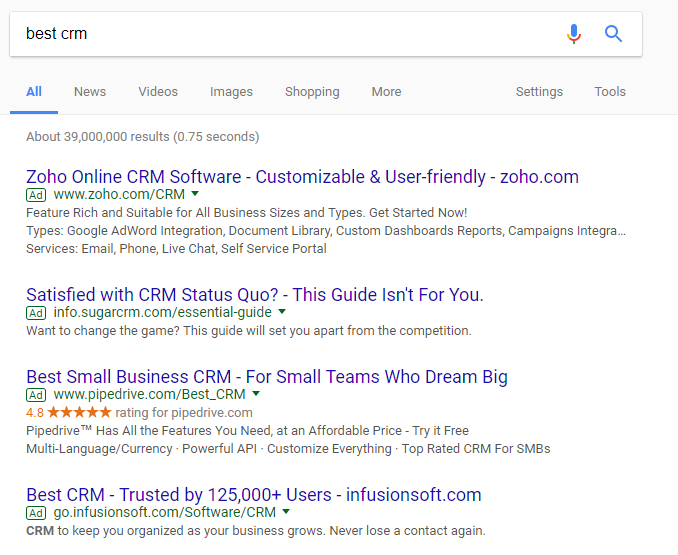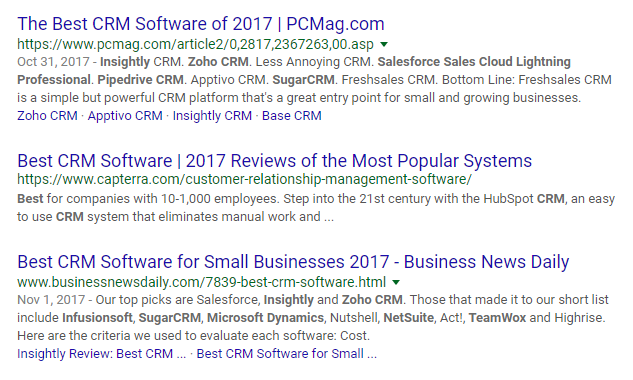Google Adwords can be a very profitable advertising platform for small businesses.
But unfortunately, not all keywords are accessible to small players.
In any given niche or industry, there's a good chance that some of the keywords with the highest search volume, and potentially the most moneymaking potential, are incredibly expensive per click.
So in a lot of cases, you might not be able to target them with search ads.
Even if you did pony up some cash for them, you probably wouldn't be able to get many clicks.
Plus, you could easily end up spending more on those ads than you make from them.
In a recent blog post, AdEspresso explains some best practices you can implement to keep ad costs down and get a better ROI from Adwords.
Check it out…
Keywords: 4 Best Practices To Set You Up For Success
We all wish that we could target the best industry keywords.
If only we could, we’d all be millionaires.
But that simply isn’t possible, nor is it necessary.
Here’s what you should be doing instead.
1. Balance low-volume and high-volume keywords
Keyword selection is a balancing act. If you choose keywords that have 100,000 monthly searches, you are likely going to pay a hefty amount in clicks simply due to the traffic.
On the other hand, a smaller volume keyword might only drive ten visits a month.
With keywords, you want a balance of both.
Remember: bigger isn’t always better. (I know what you’re thinking, and yes I’m judging you).
Just kidding. But seriously:
Skipping past vanity metrics like clicks and impressions is critical.
It doesn’t matter if you have 1,000 clicks but only one conversion. You’d much rather have 200 clicks and 20 conversions.
2. Only bid on what makes sense for your bottom line
Typical AdWords conversion rates for the search network are 2.70% on average across all industries:
Taking that number, you need to do some basic math before deciding which keywords to target.
For example, if you are selling a product for $15, you can’t have your cost per conversion be $14.
That would take hundreds of thousands of sales to see a big profit.
Let’s say the term you found has a $5 cost per click. If you take the typical conversion rate of 2.70% on 1,000 clicks, that would mean you would get 27 conversions.
But that also means you spent $5,000 to get them.
Always keep in mind the cost of your keywords and bid lower or higher based on your bottom line.
If it’s cheap, increase your bid to get more clicks and rank higher.
If it’s too expensive, bid lower to get fewer clicks at a cheaper cost.
3. Intent is critical
Intent is the most important (and overlooked) factor in keyword selection. Hands down.
AdWords excels at intent because users are actively searching for solutions.
Whereas on platforms like Twitter and Facebook, users aren’t.
Searcher intent is simply the intent behind a given search.
It’s the “why” behind the search. It answers the fundamental question of: What is the user trying to accomplish or solve with this search?
For example, when you search for a term like “windshield repair now,” you are probably desperate and looking to get this problem solved ASAP.
You’re at the bottom of the funnel almost instantly, and nearly anything can drive you to convert.
But what about a term like “best crm”? What’s the intent on that?
Likely, it’s not to purchase, but to examine a variety of options and reviews.
Yet, companies are still bidding on that term and probably paying insane costs for clicks that aren’t going to convert:
[image source: AdEspresso]
Someone searching for “best crm” probably doesn’t want to see a CRM company saying that they’re the best.
They want reviews and comparisons. A great way to see if your instinct is true is to scroll down to the organic results:
[image source: AdEspresso]
You should instantly see intent. The popular organic content is all reviews, not companies touting their prowess.
Meaning wasting money on this term isn’t going to get you anywhere.
Intent can make or break your strategy and budget.
4. Always use negative keywords to reduce ad spend
Negative keywords are critical when building a keyword list.
Simply put, negative keywords are keywords that you specifically don’t want to show your ads for.
For example, if you don’t do free consultations, you obviously don’t want to show an ad for “free consultations” and pay $20 a click.
Using negative keywords can reduce your wasted spend dramatically by cutting out terms that won’t convert.
In the next section, I’ll show you exactly how to use them to reduce your ad spend and keep costs lower when selecting keywords.
You can find more ways to maximize your Adwords ROI in the full blog post from AdEspresso.
CHALLENGE Yourself to Profit!
Free Download: Build Your Profit-Generating Online Business With This Free Blueprint
Sign Up, follow the easy steps and You'll get the tactics, strategies & techniques needed to create your online profit stream. It's free!
[adrotate group=”6″]
[adrotate group=”5″]



